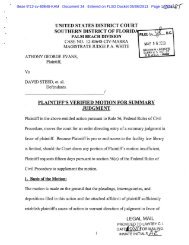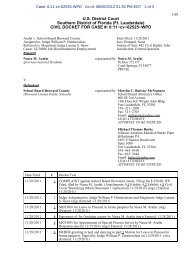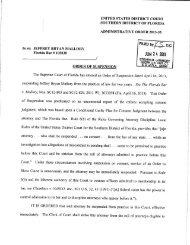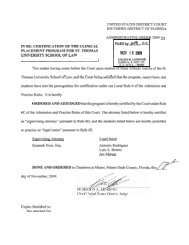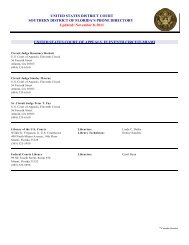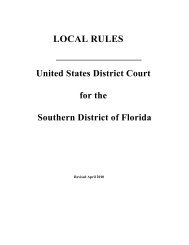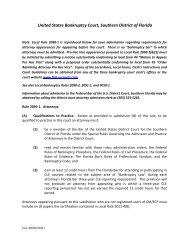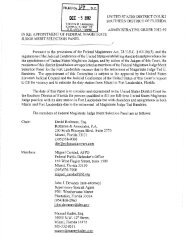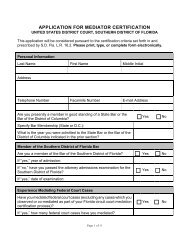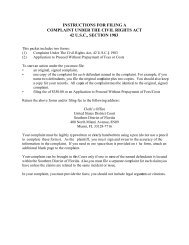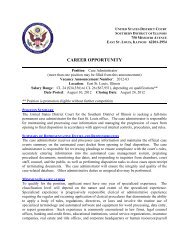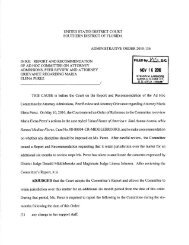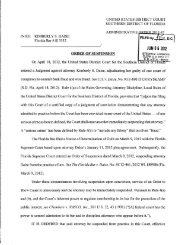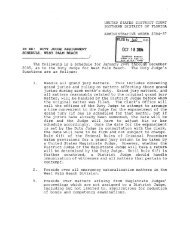JAN j 6 2010 - United States District Court
JAN j 6 2010 - United States District Court
JAN j 6 2010 - United States District Court
You also want an ePaper? Increase the reach of your titles
YUMPU automatically turns print PDFs into web optimized ePapers that Google loves.
eadily identified and located.<br />
d. Copying. "Copies" includes photocopies and electronic imaging. While<br />
copies are often prepared by the producing party for the inspecting party<br />
as a matter of convenience or accommodation, the inspecting party has the<br />
right to insist on seeing originals and the right to make direct<br />
photocopies or images from the originals.<br />
Subject to Federal Rule of Civil Procedure 26(b)(2)(B), the copying of<br />
documents and electronically stored information will generally be the<br />
responsibility of the inspecting party, but the producing party must<br />
render reasonable assistance and cooperation. In the routine case with a<br />
manageable number of documents the producing party should allow its<br />
personnel and its copying or imaging equipment to be used with the<br />
understanding that the inspecting party will pay reasonable charges. The<br />
best procedure is for documents to be delivered to an independent copying<br />
service, which can mark and, if desired by a party, image the documents<br />
at the time photocopies are made. The cost of this procedure shall be<br />
borne by the party seeking the discovery, but if an extra copy is made<br />
for the party producing the documents, that party shall bear that portion<br />
of the cost.<br />
e. Later Inspection. Whether the inspecting party may inspect the<br />
production again at a later date (after having completed the entire<br />
initial inspection) must be determined on a case-by-case basis.<br />
f. Privilege. Objections to the production of documents, electronically<br />
stored information or things based on generalized claims of privilege<br />
will be rejected. A claim of privilege must be supported by a statement<br />
of particulars sufficient to enable the <strong>Court</strong> to assess its validity.<br />
For a more detailed discussion of the invocation of privilege see the<br />
section of this handbook dealing with privilege.<br />
g. General. In most situations the lawyers should be able to reach<br />
agreement based upon considerations of reasonableness, convenience and<br />
common sense. Since the Discovery Rules contemplate that the lawyers and<br />
parties will act reasonably in carrying out the objectives of the Rules,<br />
the <strong>Court</strong> can be expected to deal sternly with a lawyer or party who acts<br />
unreasonably to thwart these objectives.<br />
IV. INTERROGATORIES<br />
A. Preparing and Answering Interrogatories.<br />
(1) Informal Requests. Whenever possible, counsel should try to exchange<br />
information informally. The results of such exchanges, to the extent<br />
relevant, may then be made of record by requests for admissions.<br />
(2) Scope of Interrogatories. The <strong>Court</strong> will be guided in each case by<br />
the limitations stated in Federal Rules of Civil Procedure 26(b) and<br />
33(a). Counsel's signature on interrogatories constitutes a certification<br />
of compliance with those limitations. See Federal Rule of Civil Procedure<br />
26 (g) (2). Interrogatories should be brief, simple, particularized and<br />
capable of being understood by jurors when read in conjunction with the<br />
96



